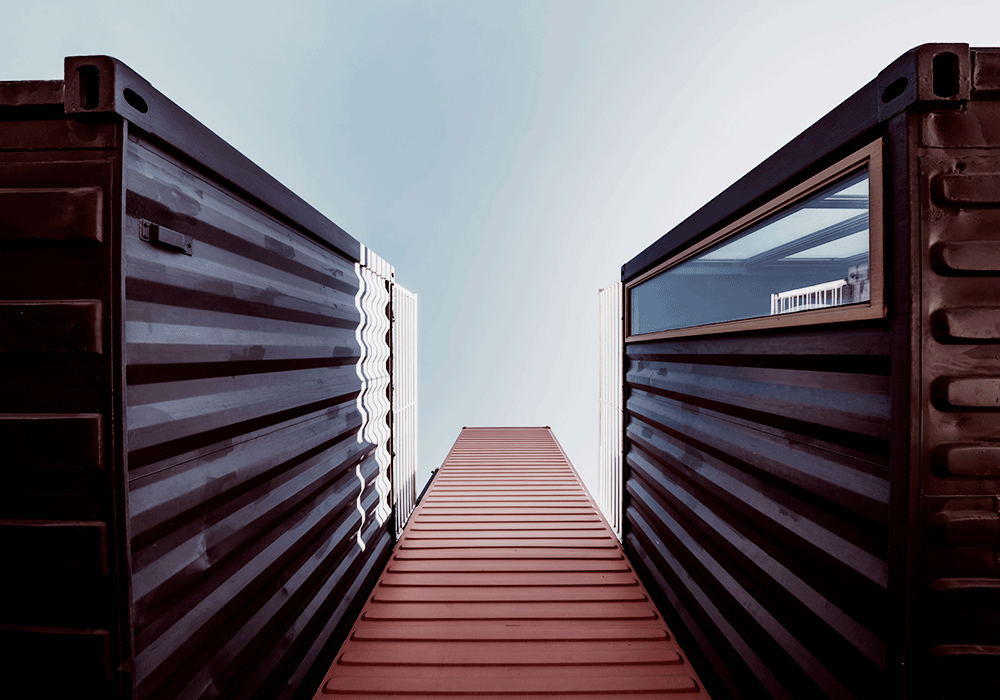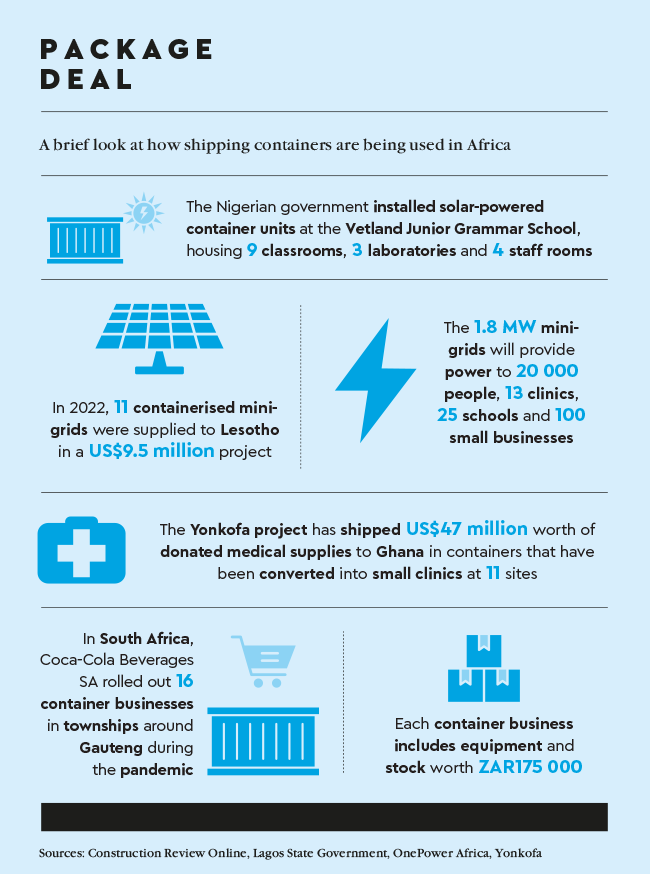Earlier this year German biotechnology company BioNTech, which aims to establish scalable messenger-RNA vaccine production in Africa, announced plans to set up a COVID-19 vaccine-manufacturing facility in Kigali, Rwanda, housed in refurbished shipping containers. Delivery of the first set of BioNTainer modules – clean rooms comprising six ISO-sized containers equipped with vaccine-manufacturing solutions – is scheduled for year-end, and the company also plans to establish factories in Senegal and South Africa. The Rwandan facility will span about 30 000 m2 and house two BioNTainer modules. Once complete, the facility will run on renewable energy.
Meanwhile, when the COVID-19 lockdown started in South Africa in March 2020, an architectural draughtsman from Soweto, Johannesburg, designed and converted a shipping container into a smart disinfecting unit to serve high-density areas whose residents could not afford to buy sanitiser or personal protective equipment. Housed in a shipping container, the unit was equipped with sensors to detect walkthroughs and automatically spray sanitiser for 10 seconds.
These are just two examples of recent uses of the ubiquitous shipping container, combining the rugged, easily portable metal structure with the latest technology.
Tony Clarke, MD of the Rawson Property Group, says shipping containers provide a unique alternative to traditional construction techniques, including their compatibility with off-grid solutions. ‘Building anywhere outside of the normal reach of municipal infrastructure can be very difficult and costly, not only because basic services would need to be installed, but also because transport for construction crews and equipment gets very expensive. The mobile nature of a container, and the fact that it can largely be built off-site, makes it a very smart solution for this type of structure.’
The demand for shipping containers as an alternative building material has steadily increased across the continent over the past few years. Willie Mouton, director of Cape Town-based container supplier Big Box Containers, says the reason is twofold. ‘To convert a shipping container is quicker than [building] brick and mortar. Secondly, you can rent different converted shipping containers for specific requirements. The increase in different types of converted containers is a clear indication that people see that they can use a shipping container for almost anything.’
‘Anything’ even includes complete water-purification systems. In Maun, near the Okavango Delta and the tourism capital of Botswana, two shipping containers have been equipped with a hybrid solar-power and battery system to power a plant that pre-treats raw water without using harsh chemicals. The plant automatically rinses and flushes the filtration system. It was designed and built by Ecotech Energy, a South African company based in Knysna in the Western Cape.
At an underground coal mine in KwaZulu-Natal, a 6m shipping container is equipped with six polycrystalline solar panels and a full smart inverter with lithium-ion batteries. Before going into the Uitkomst mine, 23 km north-east of Newcastle, one must first enter the shipping container, and pass through a turnstile equipped with an automatic hand sanitiser and biometric reader. The power-independent, standalone access-control unit was installed by Turnstar, a physical access-control and security-product supplier in Johannesburg. The installation addresses a major challenge for the mine – the lack of municipal power near the access-control point – at a fraction of the cost compared to brick-and-mortar solutions.
According to a Business Insider article, South Africans ‘increasingly want homes, businesses, and even pools made out of shipping containers’. This interest spiked during the pandemic, which caused many businesses to cut costs and downsize.
There are several benefits. Goods can be locked in weather-resistant, tamper-proof units that can also be fitted with added security systems. Container shops can be placed anywhere, subject to city bylaws, and larger containers can be divided and sub-let.
‘The biggest benefit of a shipping container is the fact that it is a strong, safe and secure movable space,’ says Mouton. ‘For any small business this is a huge advantage. If the current location is not ideal they can literally move their business to a different location. In 2021, we built a coffee shop and delivered it to a site in Pretoria East. Three months later, we picked it up and moved it to a different location in Pretoria. The business is movable, but still secure. Shipping containers are nothing more than huge LEGO blocks. As a business develops and their requirements for movable space changes, we can adapt to this need by either building something new or by adding onto an existing converted container.’
About a 20-minute drive from the coastal city of East London, in South Africa’s Eastern Cape province in one of the oldest townships in the area, stands a newly erected shopping centre made entirely out of re-purposed shipping containers. The temperature-controlled boxes are connected to water and electricity, and house 17 local traders who offer various services, including hair salons, shoe repairs, arts and crafts businesses, a printing shop, fast food and internet cafés.
The ZAR3.4 million project in the Scenery Park township was launched in March as part of the Buffalo City Metropolitan Municipality’s informal trader infrastructure programme, which was first rolled out in 2018 by the business development unit, in the areas of Ntabozuko, Mdantsane, Zwelitsha and Bhisho.
‘Containers are a great way to introduce marketplaces and social hubs within informal communities, providing safe spaces for small business owners to set up shop,’ says Clarke. ‘Our current unemployment crisis makes it essential for us to stimulate this kind of entrepreneurial economy, and intelligent use of shipping containers could go a long way towards facilitating that goal.’
The demand for these steel boxes is not limited to South Africa. Last year, Nnaemeka Ikegwuonu, founder of solar-powered food-storage innovation ColdHubs, won the US$1.5 million AyuTe Africa Challenge for his containerised approach to combating food waste.
The idea came about when he realised just how much fresh food market vendors lost if it did not sell before spoiling. According to CNN, about 40% of Nigeria’s locally produced food is lost before it reaches consumers. Since its launch in 2015, more than 5 250 smallholder farmers, retailers and wholesalers use these cold rooms to store their produce to reduce waste and increase profits. In 2020, food stored at ColdHubs units surpassed 40 000 tons of food. Ikegwuonu’s units are powered by solar energy and can keep produce fresh for up to 21 days.
In Kenya, one example of re-purposing containers is the DigiTruck project, which received the Global Mobile Award at the Mobile World Congress 2022 earlier this year. It is operated by international non-profit Close the Gap, in partnership with Chinese multinational Huawei. The used-shipping-container-turned-mobile-classroom can accommodate 20 workstations and provides digital skills training to underserved areas.
‘The DigiTruck programme that Close the Gap developed with Huawei is going above and beyond to turn a challenge into an opportunity,’ says Olivier Vanden Eynde, founder and CEO of Close the Gap. ‘Remote and off-grid locations can be fully turned digital to generate more inclusiveness and self-reliance for young people and empower communities.’ Since its roll-out in 2019, more than 2 300 students have received in excess of 80 000 hours of training across 19 counties in Kenya. Courses also include other skills, such as draughting business documents, searching for jobs online and starting an online business.
According to the Rawson Property Group, containers also have the potential to be more economical for longer than brick-and-mortar options, noting that they ‘are durable, resisting the rigours of harsh climatic conditions. At the start of the container-building industry the thought was rife that modules would only be useful within ghettos, providing sub-economic housing for the underprivileged, but this is certainly no longer the case’.
It adds that ‘enterprising designers, architects as well as engineers have joined forces to erect some amazing structures that can take their place proudly among conventional building styles. As an outside-the-box solution to a commercial accommodation need, be it a small spaza shop, a multi-storey office or a hotel, shipping containers are fulfilling a need for fast, easily maintained structures which may be permanent, temporary or portable’.



















